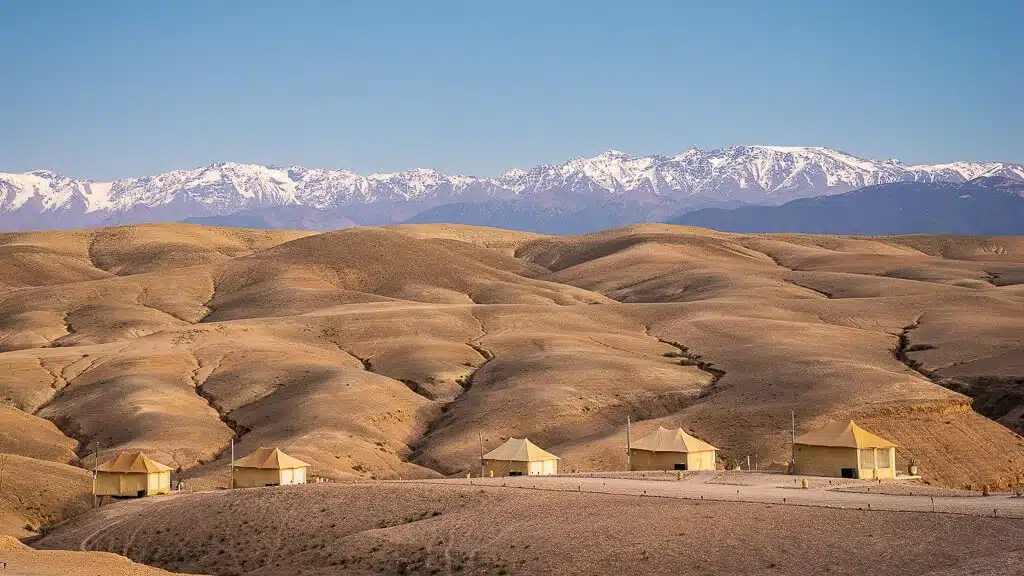The Agafay Desert in Morocco provides a distinctive ecotourism experience by promoting green tourism initiatives and fusing traditional camel rides with environmentally friendly hospitality.
The ultimate desert experience via camel ride is a unique adventure that tourists are taking in the Agafay region of Morocco, only 35 kilometers from the busy city of Marrakech. This age-old form of transportation is not merely a new idea; it is an essential component of Morocco’s ecotourism campaigns to encourage environmentally friendly travel.
Morocco’s tourism minister, Fatim-Zahra Ammor, recently underlined the nation’s dedication to sustainability in the travel and tourism industry. With areas like Agafay that are perfect for exhibiting Morocco’s natural beauty while preserving ecological balance, this June announcement represented a major push towards eco-tourism.
Eco-tourism is becoming more popular, according to Morocco’s tourism data. Approximately 5% of the 17.6 million tourists who visited the nation in the first half of June participated in ecotourism activities. About 3% of this ecotourism came from the Agafay region alone, demonstrating its popularity with eco–aware tourists.
The Kasbah Agafay Hotel and Spa is one of the first ecotourism projects in the Agafay area. Through a variety of activities, visitors can fully immerse themselves in the local culture at this establishment, which is designed in the style of a traditional Kasbah. The owner, Abdessalam Damoussi, purchased the centuries-old stone building in 1996 and spent four years restoring it with locally sourced, sustainable materials. Since its opening in 2000, the Kasbah Agafay has led the way in the Agafay desert by balancing opulent hospitality with a profound regard for the environment and the local population.
A book that emphasized the close bond between people and the land served as Damoussi’s inspiration. This idea has shaped the Kasbah’s growth and established it as a template for other ecotourism projects. Since 2018, other travel agencies have followed suit, which has helped the area gain more recognition. Approximately 5,000 tourists visit the Kasbah Agafay each year, and they are all urged to make meaningful connections with the environment. Experiences that honor the area’s natural and cultural heritage are available to visitors to Kasbah Agafay. These consist of hiking, camel and horseback riding, hammam ceremonies, spa treatments, local music performances, and cooking classes. In particular, the cooking classes provide a special chance to interact with the land. After selecting organic fruits, vegetables, and herbs from the Kasbah‘s garden, visitors cook traditional meals in an outdoor kitchen under the supervision of a chef.
Visitors’ understanding of Moroccan culinary traditions is enhanced by this practical experience, which also emphasizes the significance of farm-to-table methods.
The Kasbah offers lodging in both traditional tents erected on the grounds and rooms inside the stone building. These tents provide a genuine desert experience because they are made of natural materials like leather, wood, and wool. The Kasbah‘s large windows, high wooden ceilings, and thick stone walls all work together to keep the interior climate comfortable all year round, which lessens the need for energy-intensive heating and cooling systems. Damoussi is always looking for methods to make his company more sustainable. He is dedicated to expanding the ecological envelope even though he views eco-tourism as a supplement to conventional tourism offerings. More extensive measures are being taken by Morocco‘s government to assist companies such as Kasbah Agafay. The “Go Siyaha” initiative, which aims to promote national green growth, was recently announced by Tourism Minister Fatim-Zahra Ammor. By giving Moroccan tourism companies the chance to implement more energy-efficient procedures, this initiative will strengthen Morocco’s standing as a pioneer in environmentally friendly travel.
By these initiatives, Morocco is improving the experiences of visitors to its natural landscapes while simultaneously protecting them. With its distinctive fusion of contemporary sustainability and traditional hospitality, the Agafay region is a shining example of how ecotourism can flourish and provide visitors with an amazing experience deep within the desert.
